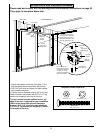
Adjustment Step 2
Adjust the Force
Too much force on the door will interfere with the
proper operation of the safety reverse system.
The door might not reverse properly when
required and could seriously injure or kill
someone under it.
Do not increase the force
beyond the minimum amount required to close
the door. Do not use the force adjustments to
compensate for a binding or sticking garage door.
Test the safety reverse system following all
adjustments to force levels. See page 26.
Force adjustment controls are located on the right
panel of the opener. Force adjustment settings
regulate the amount of power required to open and
close the door.
The door will
stop
in the
up
direction if anything
interferes with its travel. The door will
reverse
in the
down
direction if anything interferes with its travel
(including binding or unbalanced doors).
If the forces are set too light, door travel may be
interrupted by
nuisance reversals
in the
down
direction and
stops
in the
up
direction. Weather
conditions can affect the door movement, so
occasional adjustment may be needed.
The maximum force adjustment range is 260 degrees,
about 3/4 of a complete turn. Do not force controls
beyond that point. Turn force adjustment controls
with a screwdriver.
Force Adjustment Label
Force
Adjustment
Controls
Right Panel
of Opener
KG
KG
1
3
9
7
5
1
3
9
7
5
KG
KG
M.D.C. CERT. NO.
1
3
9
7
5
132C2105-1
WARNING: To reduce the risk of severe injury
or death by entrapment, when adjusting either
the force or limits of travel controls ensure that
the door reverses on a 1 inch object (or a 2 x 4
board laid flat). See instructions for proper
adjustment procedure.
This device complies
with FCC Rules Part
15. Operation of this
device is subject to the
following conditions:
1. This device may
not cause harmful
interference. 2. This
device must accept
any interference
that may be received,
including interference
that may cause
undesired operation.
PART NO: Nº DE PIÈCE:
D.O.C. CERT. NO.
DATE:
AVERTISSEMENT: Pour réduire les risques de
blessures mortelles par happement, après tout
réglage de la force de déclenchement ou des
seuils de fin de course s'assurer que le sens de
la course s'inverse lorsque la porte entre en
contact avec un object de 13 mm (1 po) de
hauteur (ou un madrier de 2 x 4 de section, à
plat) posé sur le sol. Effectuer les reglages
selon les procédures décrites dans la notice.
1
3
9
7
5
1
2
3
How and When to Adjust the Forces
Test the DOWN (close) force
Grasp the door bottom when the door is about
halfway through DOWN (close) travel. The door
should reverse. (Reversal halfway through down
travel does not guarantee reversal on a one inch
obstruction. See page 26.) If the door is hard to
hold or doesn't reverse, decrease the DOWN (close)
force by turning the control counterclockwise.
Make 10 degree turn adjustments until the door
reverses normally. After each adjustment, run the
opener through a complete cycle.
Test the UP (open) force
Grasp the door bottom when the door is about
halfway through UP (open) travel. The door should
stop. If the door is hard to hold or doesn't stop,
decrease UP (open) force by turning the control
counterclockwise.
Make 10 degree turn adjustments until the door stops
easily. After each adjustment, run the opener through
a complete travel cycle.
If the door doesn't open
at least
5 feet
Increase UP (Open) force by turning the control
clockwise. Make 10 degree turn adjustments until
door opens completely. Re-adjust the UP limit if
necessary. After each adjustment, run the opener
through a complete travel cycle.
If the door
reverses
during the down (close) cycle
and the opener lights aren't flashing
Increase DOWN (close) force by turning the control
clockwise. Make 10 degree turn adjustments until the
door completes a close cycle. After each adjustment,
run the opener through a complete travel cycle. Do
not increase the force beyond the minimum
amount required to close the door.
25
WARNING


















